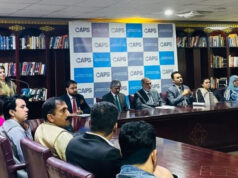Adnan Aamir
Ali Jan Baloch is a student of LLB at Law College Quetta. He returned to his home in district Kech in March after educational institutes closed down due to the COVID-19 pandemic. Earlier this month, he was told by his college that he has to attend online classes. “There is no internet connectivity in my hometown and it is not possible for me to attend these [online] classes,” he told The Friday Times.
Abdul Khaliq belongs to tehsil Jhal-Jhao of the Awaran district. He is a student of MBBS at Bolan University of Health and Medical Sciences. He has to travel two kilometers every day to Awaran Mashi where he gets the bare minimum fixed-line internet connectivity to attend his online classes. He lamented that the suspension of mobile internet has made it very inconvenient and costly for him to attend classes.
These two are among the thousands of students who are facing problems in attending their online classes due to the suspension of mobile internet in several districts of Balochistan on the pretext of security.
The student alliance has announced to hold a hunger strike camp outside HEC headquarters in Islamabad against this decision next week
Once all institutes closed down in March, the Higher Education Commission (HEC) directed them to start online classes. In April, the HEC decided to inspect the capacities of universities to deliver online classes. However, without taking into account the problems faced by students in remote areas, the HEC started began pressuring universities to start mandatory online classes from mid-May onwards.
This decision of the HEC has particularly affected students from Balochistan studying in universities all over the country. In March, these students returned to their homes from places like Islamabad, Lahore, Karachi, and Quetta. Mobile internet is suspended in 14 districts of Balochistan and 65 percent of the population has no access to the internet. Consequently, these students are in a predicament on how to attend their classes. If they do not attend the classes, then their entire academic year will be lost.
The University of Balochistan is the largest public sector university in the province. It has also started online classes. It caters to tens of thousands of students and most come from districts with no internet connectivity. Most of these students have been completely cut off from education except for those who can afford to travel to major cities just to get internet connectivity.
These students have now united under the Balochistan Students Alliance and are protesting this flawed decision of the HEC. Protest rallies were held against this decision of HEC in several districts of Balochistan, including Surab, Panjgur, Khuzdar, Pasni, Turbat, and Quetta. A symbolic hunger strike was also organized in Quetta, Khuzdar, and also Karachi. Students are also using the hashtag #SayNoToOnlineClasses to protest against this decision on Twitter and other social media platforms. Students allege that HEC has completely ignored the ground realities of Balochistan while imposing the decision of online classes. The student alliance has announced to hold a hunger strike camp outside HEC headquarters in Islamabad against this decision next week.
Zakia Baloch, vice president of the Baloch Students Action Committee (BSAC) Quetta Zone, is actively participating in these participants. She lives in Pishukan, a remote town in Gwadar district. “The internet is so weak that we have to wait for hours just to open a page. In such a situation, taking online classes is impossible,” she told The Friday Times. She claimed that the HEC was not treating all students of the country fairly because students in Balochistan did not have the privilege of internet connectivity to attend online classes.
Zakia, a student of physiotherapy at the University of Balochistan, added that students in the province have no choice but to freeze their semester. “Internet connectivity is not our fault,” she said. She also claimed that female students are suffering more in this scenario. “Male students can travel to mountain tops and major cities to get internet connectivity which we girls cannot do,” she complained.
The students have two choices. First, they can freeze their semester and lose an entire academic year for a situation that is not in their control. The second choice is that they travel to big towns and rent accommodation there to catch internet signals. This would require financial resources which the overwhelming majority of students cannot afford in Balochistan. Unfortunately, the HEC is not providing them with any third option in this pandemic.
Senator Kabeer Muhammad Shahi, a senator from the National Party, wrote a letter to the Senate chairman demanding restoration of mobile internet in seven districts of Balochistan. He argued that this internet suspension was affecting underprivileged students of Balochistan. However, another problem is that even if the internet is available in some districts the quality, reliability, and speeds remains a major issue. Apart from certain parts of Quetta city, one can hardly find internet connectivity of acceptable quality.
Despite all these protests, the HEC remains unmoved. It said in a statement recently that online classes would continue and no students would be promoted without online examination. This rigid policy of the HEC has been made by people completely oblivious to the ground realities of Balochistan. This also raises the question of the lack of proper representation from Balochistan in the decision-making body of HEC.
The need of the hour is that HEC bosses must listen to the continued protests of aggrieved students of Balochistan. The HEC needs to adopt a fair and equitable policy of online classes and reconsider its rigid approach. The HEC along with the federal government should first make internet available to everyone across the country and then make decisions about online classes. Underprivileged students of Balochistan must not be made to suffer for reasons beyond their control.
This article was originally published in The Friday Times
Share your comments!








